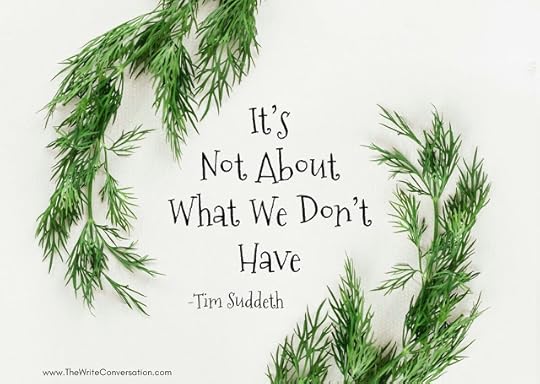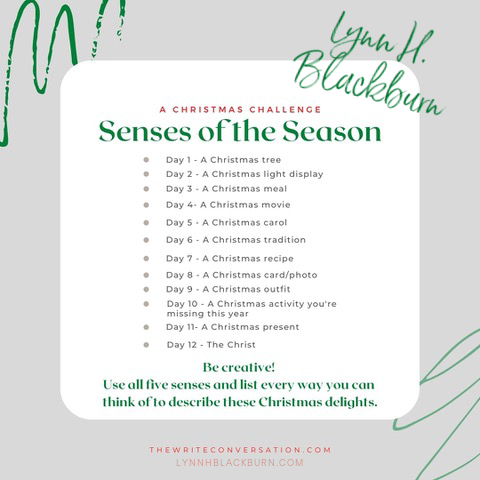Edie Melson's Blog, page 179
December 9, 2020
The 12 Ways of Christmas to Gift an Author

by Julie Lavender @JLavenderWrites
Want to be a not-so-secret Santa for fellow writer friends? Here’s 12 Ways of Christmas to gift an author. Pick a friend (or more than one friend) with a recent release and give one or more of the gifts below. Or, pick a dozen author friends and share one gift with each author.
Here’s the list, along with a verse about generosity to go with each one!
1. Locate the author’s new book on Goodreads and click “want to read.”
You shall generously give to him, and your heart shall not be grieved when you give to him, because for this thing the Lord your God will bless you in all your work and in all your undertakings. Deuteronomy 15:10
2. Ask a local bookstore to carry the author’s book.
Give, and it will be given to you. They will pour into your lap a good measure – pressed down, shaken together, and running over. For by your standard of measure it will be measured to you in return. Luke 6:38
3. Purchase the author’s book in a local bookstore, or order the author’s book, digital or print. After reading the book, add the book to your personal collection, share with your church’s library, or give it away to a friend to read, also.
But just as you abound in everything, in faith and utterance and knowledge and in all earnestness and in the love we inspired in you, see that you abound in this gracious work also. 2 Corinthians 8:7
4. Sign up for the author’s newsletter.
A generous person will prosper; whoever refreshes others will be refreshed. Proverbs 11:25
5. Ask your church librarian to order the book.
Each one must do just as he has purposed in his heart, not grudgingly or under compulsion, for God loves a cheerful giver. 2 Corinthians 9:7
6. Mention the book to the appropriate minister in your church. If the book is a board book or picture book, share the title with the children’s minister. Women’s fiction? Share the title with the women’s ministry coordinator.
Whatever you do in word or deed, do all in the name of the Lord Jesus, giving thanks through Him to God the Father. Colossians 3:17
7. Send an encouraging or affirmative email or private message on social media to the author.
Honor the Lord with your wealth, with the firstfruits of all your crops.Proverbs 3:9
8. Write a review of the book and post on Amazon, Goodreads, Books A Million, Barnes and Noble, and Christianbook.com.
Give to everyone who asks of you. Luke 6:30
9. Post about the author’s book on your Facebook page.
For God so loved the world, that He gave His only begotten Son, that whoever believes in Him shall not perish, but have eternal life. John 3:16
10. Post a message about the author’s book on Twitter.
But who am I, and who are my people, that we should be able to give as generously as this? Everything comes from you, and we have given you only what comes from your hand. 1 Chronicles 29:14
11. Post a picture of the book and message on your Instagram account.
Ascribe to the Lord the glory due His name; Bring an offering, and come before Him; Worship the Lord in holy array. 1 Chronicles 16:29
12. Add a mention of the author’s book on your Pinterest page.
And whoever in the name of a disciple gives to one of these little ones even a cup of cold water to drink, truly I say to you, he shall not lose his reward. Matthew 10:42
Enjoy the blessing of giving this holiday season. Give gifts to fellow authors, because it truly is better to give than receive!
Merry Christmas to all, and to all, a good write!
TWEETABLEThe 12 Ways of Christmas to Gift an Author - @JLavenderWrites on @EdieMelson (Click to Tweet)
 Julie Lavender, author of 365 Ways to Love Your Child: Turning Little Moments into Lasting Memories (Revell), loves helping other authors and is grateful when fellow writers bless her with encouragement and support. Connect with Julie on social media, and she’ll rejoice in adding another writer to her collection of friends! And she’d be especially honored if you’d consider her book when shopping for parents and grandparents on your shopping list!
Julie Lavender, author of 365 Ways to Love Your Child: Turning Little Moments into Lasting Memories (Revell), loves helping other authors and is grateful when fellow writers bless her with encouragement and support. Connect with Julie on social media, and she’ll rejoice in adding another writer to her collection of friends! And she’d be especially honored if you’d consider her book when shopping for parents and grandparents on your shopping list! 365 Ways to Love Your Child
365 Ways to Love Your Child
Growing up in a financially strapped, South Georgia farming family, Julie Lavender learned to appreciate small yet meaningful affirmations of love when her parents found ways to visibly demonstrate their feelings. Later, when she had her own children, Julie delighted in finding creative ways to express her love for them, as well as for the children whose lives she touched through teaching school and volunteering in the children's ministry at her church.
In 365 Ways to Love Your Child, Julie encourages moms, dads, and anyone who works with children to show kids every day with simple but meaningful gestures and activities how very much they are loved. Join Julie in expressing tangible acts of love to show your kids they are valued by their parents and, most especially, by God.
Published on December 09, 2020 22:00
December 8, 2020
Follow the "Writing" Recipe

by Linda Gilden @lindagilden
“Mmmmm!”
“Yum! This is the best turkey ever.”
“Oh, my goodness. This is delicious.”
I agreed the turkey was exceptionally good this year. But what was the difference in this one and all the other turkeys we had eaten for holidays and birthdays?My daughter finally spoke up. “I smoked it just the way we always do. But before I put it in the smoker I marinated it for a few hours.”
It was at that point I realized how much cooking was like writing. That thought seemed a little odd to me since I don’t particularly like to cook but rarely want to quit writing to eat or sleep.
The reason the turkey was so good was the extra preparation my daughter put into it this year. She had carefully mixed the brine together. Created a rub we would all enjoy. And carefully followed the correct steps through the smoking process.
The "Writing" Recipe
I realized I often think about skipping or skimping on the preparation of my project. Some time it seems like spending hours researching one subject to write just a thousand words or so is excessive. But more often than not, I find the research is the thing that makes my article or book even stronger. If you don’t start your project with research, you will often find your work is shallow and fails to satisfy those info-hungry readers. And even though the research may not officially find its way onto the paper, adding to your storehouse of knowledge on your subject will add to your personal understanding, therefore your ability to write
The next step, mixing all the “spices” together is what makes your writing “tasty” to your readers. You can combine your information in many forms and in more than one order but your job is to find the best and most palatable combination. Using an outline can often be helpful with this.
Once your article is complete you must “carve” it, leaving the good parts in and discarding extra words, repetitious phrases, and passive voice. Many writers do not find editing fun but it is necessary to make your writing clear. Then you can arrange your article for your readers to enjoy the takeaway.
Writing an article is often just as time consuming as cooking. But often, the results are dependent upon following the recipe. Guidelines help us stay on track and increase our chances of publication because we are sending exactly what the editor is asking for (which means less work for him or her!).
During this unprecedented Christmas season, may all your recipes yield great success, your writing find that perfect publication match, and may your hearts and homes be filled with the love of Christ.
TWEETABLEFollow the "Writing" Recipe - @LindaGilden on @EdieMelson (Click to Tweet)
 Linda Gilden is an award-winning writer, speaker, editor, certified writing and speaking coach, and personality consultant. Linda is the author of 19 books and over 1000 magazine articles. She enjoys every meeting with editors and knowing we are all part of the same team. Linda’s favorite activity (other than eating folded potato chips) is floating in a pool with a good book surrounded by splashing grandchildren—a great source of writing material! www.lindagilden.com
Linda Gilden is an award-winning writer, speaker, editor, certified writing and speaking coach, and personality consultant. Linda is the author of 19 books and over 1000 magazine articles. She enjoys every meeting with editors and knowing we are all part of the same team. Linda’s favorite activity (other than eating folded potato chips) is floating in a pool with a good book surrounded by splashing grandchildren—a great source of writing material! www.lindagilden.com
Published on December 08, 2020 22:00
December 7, 2020
Tips for Presenting Your Best Work as a Writer

by Cindy Sproles @CindyDevoted
There is no perfect work. Regardless of the number of eyes on a manuscript, someone will miss something. For example, my first novel went through edits, and three – count them – three proofers. and still, a conferee came up to me at a conference where my editor and I were talking and pointed out that my one-armed man was clapping his hands.
Though we got a big laugh out of the mistake, it was still frustrating knowing we’d worked so hard to catch all the little details. Begin right now, to give yourself and your editors grace. There is no perfect manuscript.Just because there is no perfect manuscript, doesn’t mean we don’t do our best work to the very best of our abilities. This means setting a personal work ethic that offers you guidelines for daily work and presentation when the time arrives.
Work ethic entails so many variables and only you can decide where you draw the line on how you present your work. From here forward, I am going to share my personal work ethics because it’s more than getting up each day to write. Our work ethic includes quality, honesty, integrity, and presentation.
Everybody is different and the thought process is equally as different but despite those, each writer must lay out a personal code of ethics that they abide by.
Here are some suggestions to help you layout and stick to a work ethic that will help your writing career soar.
Present your best work: Because I am a bit anal retentive about things, I lean toward taking extra measures to be sure my presentation of work to publishers is the best it can be. Again, everyone is different but my thought process is this – when I present the cleanest work I can to a publisher, they read through and smile. They remember the effort that went into handing over a clean, well-done manuscript and they note that the work on their end is cut significantly on editing and proofing. This translates into time and money saved.
Does it always secure a new contract? No, but it certainly doesn’t hurt. Part of the process involved in a publication board’s decision to contract is the time factor. If they contract a work that its content may be really good but it needs a lot of edits, it certainly adds up to manhours and money. My practice is to personally hire a content editor to go behind me after my manuscript is complete. Yes, it costs me money but it is an investment that brings good payback. Editors look at my work and take a sigh of relief because they recognize an extra step has gone into presenting a clean manuscript.
Not only does this help in the editing process but for me personally, it establishes a good reputation that hopefully will follow me. There is something to be said for work well-presented. There is a cost involved but again, I look at the cost as an investment into my career. You may not see a need to take this step, and again, it’s all in your personal work ethic, but I can assure you, it’s a step that has never taken me down the wrong path.
Meet deadlines: I love it when I contract an author whose work, that isn’t due for several months, ends up on my desk weeks early. This shows me I’m working with an author who cares about their work and who honors my time and the time of my editors. There will be times when life hits with illness or loss and publishers are very willing to work with authors during these times, but for the author who just puts off doing the work, then asks for continual extensions – the fuse is short. Here’s why. When an author asks for an unnecessary extension, it not only affects their editor’s timeline of the books’ publication, the entire work line is hit.
Editors are generally working on more than one book at a time. Their days are planned out for which book to work on. Proofers are assigned and expect work on a certain day. Marketing is set to start on a particular day. When a deadline is missed, everyone’s schedule is thrown out of wack. You wonder why publishing is a slow industry; this is why. Several groups are working all at the same time, each with different deadlines but all heading toward the final goal of a release date. Procrastinators make life hard for everyone. Make it a goal to meet your deadlines on time or early. Do your best to avoid being a last-minute doer because this WILL affect whether or not you receive a future contract. Remember that reputation we mentioned earlier? How do you want to be perceived?
Be a person of your word: There is little to add here. If you say it, do it. Integrity is valuable and vitally important. When you do what you say, it speaks volumes about your dependability, honesty, and determination to produce good work. Be a person of your word. It carries as much weight in the industry as a clean manuscript.
Be a team player: When you are a team player, everyone’s work is easier. If an editor knows you have a willing and teachable heart, they do not fear coming to you to make last minute changes that will make your work shine. Marketing will work twice as hard with a team player because they know the work will be done and the rewards will come. Writers want a reputation that speaks to a willingness and emulates a desire for quality work.
Your work ethic is vital. If you haven’t done so, even as a new writer, draw up a list of work ethics you’d like to adhere to. It’s never too late to begin to build the habits and reputation that will bring you great success.
TWEETABLETips for Presenting Your Best Work as a Writer - @CindyDevoted on @EdieMelson (Click to Tweet)
 Cindy K. Sproles is an author, speaker, and conference teacher. She is the cofounder of Christian Devotions Ministries and the executive editor for christiandevotions.us and inspireafire.com. Cindy is the lead managing editor for SonRise Devotionals and also Straight Street Books, both imprints of LPC/Iron Stream Media Publications. She is a mentor with Write Right and the director of the Asheville Chrisitan Writers Conference held each February at the Billy Graham Training Center, the Cove, Asheville, NC. Cindy is a best selling, award winning novelist. Visit Cindy at www.cindysproles.com.
Cindy K. Sproles is an author, speaker, and conference teacher. She is the cofounder of Christian Devotions Ministries and the executive editor for christiandevotions.us and inspireafire.com. Cindy is the lead managing editor for SonRise Devotionals and also Straight Street Books, both imprints of LPC/Iron Stream Media Publications. She is a mentor with Write Right and the director of the Asheville Chrisitan Writers Conference held each February at the Billy Graham Training Center, the Cove, Asheville, NC. Cindy is a best selling, award winning novelist. Visit Cindy at www.cindysproles.com.
Published on December 07, 2020 22:00
December 6, 2020
Please Nominate The Write Conversation for the Writer's Digest 101 Best Websites for Writers

by Edie Melson @EdieMelson
It's that time of year again. Writer's Digest is accepting nominations for the top writing blogs. We'd be so honored if you'd nominate us again this year.
Here's the link:
Call for Nominations: 101 Best Websites for Writers There is a short form you'll need to fill out to nominate websites. Don't be shy, you can nominate as many sites as you wish and there are a lot of good ones out there! You can also nominate social media accounts, like @EdieMelson (Twitter).No matter whether we make the list or not, I KNOW we have the best community of any blog on the internet!
Thanks & Blessings,Edie & The Write Conversation Team
TWEETABLEPlease Nominate The Write Conversation for the Writer's Digest 101 Best Websites for Writers - @EdieMelson (Click to Tweet)
Published on December 06, 2020 22:00
December 5, 2020
Joseph, The Grace Giver

by Audrey Frank @AudreyCFrank
This is how the birth of Jesus Christ came about: His mother Mary was pledged to be married to Joseph, but before they came together, she was found to be with child through the Holy Spirit. Because Joseph her husband was a righteous man and did not want to expose her to public disgrace, he had in mind to divorce her quietly. But after he had considered this, an angel of the Lord appeared to him in a dream and said, “Joseph, son of David, do not be afraid to take Mary home as your wife, because what is conceived in her is from the Holy Spirit. She will give birth to a son, and you are to give him the name Jesus, because he will save his people from their sins.” …When Joseph woke up, he did what the angel of the Lord commanded him and took Mary home as his wife. But he had no union with her until she gave birth to a son. And he gave him the name Jesus (Matthew 1:18-21, 24).
Joseph, the husband of Mary and earthly father of Jesus, was a grace-giver.It has been said that grace is when one does not give an offender what he or she deserves. How difficult! How nearly impossible when the heart is devastated by another’s actions!
In Joseph’s time, the betrothal promise was binding. He and Mary were, essentially, married. She had evidently violated their commitment to each other and slept with another man, resulting in pregnancy. According to the law, Joseph had a right to publicly disgrace Mary, even stone her. In honor-shame cultures, to live disgraced was worse than stoning. The shamed woman would live the rest of her life alone, ostracized, marked as irreparable. In the opinions of many, death might have been more merciful.
Joseph understood this and compassionately decided to offer what remaining protection he could and divorce her quietly.
He was at the limit of his understanding of what to do in such a painful situation, and he made the plan that seemed best to him.
That is exactly where God showed up. At the end. The limit. Right there where Joseph sat, his head in his hands, hair poking every direction from running his fingers through it as he stressed for hours over what to do. He was done thinking, considering. This is what he must do: divorce her quietly and at least give Mary a delay from the shame and loss that was certainly coming to her.
The rest… well it was in God’s hands. His blurry eyes closed in the exhausted sleep of the broken-hearted.
Here at the end of Joseph’s strength, God appeared.
Joseph, son of David, do not be afraid to take Mary home as your wife, because what is conceived in her is from the Holy Spirit. She will give birth to a son, and you are to give him the name Jesus, because he will save his people from their sins (v. 20-21).
In those astonishing words, Joseph glimpsed God’s magnificent grace. What he thought was a problem between him and Mary was in fact a promise fulfilled. This revelation of grace compelled him to do exactly what the Lord commanded.
Joseph's choice to obey the Lord cost him. Now he would bear disgrace in the eyes of the community right alongside Mary. Their first son would be born into a context of cultural misunderstanding and shame. And the truth was simply too spectacular to be believed by most.
Joseph chose to be misunderstood. Being a grace-giver means we lay down our rights and at times, our reputations, in exchange for the good of others and the glory of God. We may be misunderstood, and we choose to live with that.
A grace-giver does not merely cover the apparent sins of others to protect them from disgrace, nor make a quick exit plan to distance himself from the offender.
This is a hard one, especially in today’s world of masks, social media blocking, and unfriending. We are easily offended by much less than something so serious as Mary’s supposed betrayal. And it is easier than ever to walk away. Create distance. Never speak again.
Even as I write this, I am convicted of my graceless reaction to an editor three years ago who rejected me. Since that time, I have complained, judged, and hardened my heart. If my message today is of any value, I must ask God’s forgiveness and trust Him to show me what to do.
A grace-giver submits her perspective and understanding to God’s greater Perspective and Understanding. The Lord sees every heart, all the details, everything that is hidden from our limited, human view. And you never know what someone else is going through.
A grace-giver trusts God’s sovereignty in situations he cannot explain or fully understand. Grace requires faith. Faith that God will indeed work all things together for good for those who love Him and are called according to His purpose, even when things really look bad.
We talk often about peace, love, and joy at Christmastime. Joseph teaches us that grace is what made it all possible.
I want to be a grace-giver this Christmas. Join me?
Lord, make me a grace-giver through my words and my actions. Thank you for your grace toward me. Amen.
TWEETABLEJoseph, The Grace Giver - @AudreyCFrank on @EdieMelson (Click to Tweet)
 Audrey Frank is an author, speaker, and storyteller. The stories she shares are brave and true. They give voice to those whose words are silenced by shame, the hard things in life that don’t make sense, and the losses that leave us wondering if we will survive. Audrey and her family have spent over twenty years living and working among different cultures and world views, and she has found that God’s story of redemption spans every geography and culture. He is the God of Instead, giving honor instead of shame, gladness instead of mourning, hope instead of despair. Although she has three different degrees in communication and intercultural studies, Audrey’s greatest credential is that she is known and loved by the One who made her.
Audrey Frank is an author, speaker, and storyteller. The stories she shares are brave and true. They give voice to those whose words are silenced by shame, the hard things in life that don’t make sense, and the losses that leave us wondering if we will survive. Audrey and her family have spent over twenty years living and working among different cultures and world views, and she has found that God’s story of redemption spans every geography and culture. He is the God of Instead, giving honor instead of shame, gladness instead of mourning, hope instead of despair. Although she has three different degrees in communication and intercultural studies, Audrey’s greatest credential is that she is known and loved by the One who made her.Audrey is the author of Covered Glory: The Face of Honor and Shame in the Muslim World (Harvest House Publishers), an outpouring of Audrey’s heart to introduce others to the God of Instead. Shame is not unique to the developing world, the plight of the women behind veils, young girls trafficked across borders; shame is lurking in hearts everywhere. Through powerful stories from women around the world, Covered Glory illuminates the power of the Gospel to remove shame, giving honor instead. Available at favorite booksellers: BARNES & NOBLE , BOOKS A MILLION, AMAZON.
You can also find Audrey at WWW.AUDREYFRANK.COM, as well as on TWITTER and FACEBOOK
Published on December 05, 2020 22:00
December 4, 2020
It’s Not About What We Don’t Have

by Tim Suddeth @TimSuddeth
This time of year, from Thanksgiving to Christmas, is my favorite season. Everyone just seems to be a little nicer to each other. The food, the music, the parties. The hustle and bustle of shopping for gifts. Christmas decorations, toy drives. Hearing ‘Merry Christmas’ shouted on the street, Christmas movies, chocolate. Families, churches and communities coming together, and—
Screech.Like someone bumping a turntable playing “It’s a Holly, Jolly, Christmas’, it all came to a halt this year. 2020. The year of the virus. Bah humbug.
That’s how it felt a few months ago, wasn’t it? But now, after we’ve had time to shake ourselves off and sort of get our bearings, we realize we haven’t lost Christmas. It wasn’t cancelled, closed down, or taken away. You can’t erase a birthday.
‘The Nutcracker’ and the church musicals may be restricted to a socially-distanced few, seen virtually, or postponed until next year. Parades and caroling may still be done outdoors but, this year, while we’re wearing masks and staying at a safe distance.
Christmas will be different.
The Christmas of Less
This may be the Christmas of less. Still filled with God’s light and love but looking a little less bright.
But, overwhelmed as we all are with all the losses and changes, let’s not lose sight of all the gifts and blessings that still remain.
Christmas is here again this year to remind us of that Little Baby, who the teenage girl Mary laid in a manger, who came down to save the world. Us. Me and you.
And that special joy that comes during this season that we see in other’s smiles, hear in their laughter, and witness in their caring for others, it will be here, too. Even if it is hidden behind a mask.
We can still hang our lights, put out our nativity sets, and sing the old carols off key and with misplaced words. Though we probably won’t be able to share as much hot cocoa.
We can still choose to be the light in a darkening world.
The Christmas of Little Things
Maybe this will be the year of little things. Many of us are staying in more this year, and/or our jobs have been cutback or lost altogether. Instead of grand gatherings and giant feasts, maybe this should be the year we get together in smaller groups. Instead of a party or going to a coffee shop, send a card, an email, or a text.
An old friend of mine used to surprise us with, what she called, serendipities. Just a little something she’d found to let us know she was thinking of us. Not to impress anyone or to get something in return, but just to let us know she thought we were special.
Isn’t this a great year, and season, for some serendipities? Not exchanging gifts but giving a gift just to let that person know that you were thinking of them and that they are special.
Doesn’t that better illustrate why God sent us the gift of Jesus? Not because He expected something in return from us. I can draw a childish picture of a yellow circle to represent the sun. He has made more stars than we can’t count.
Yet, He wanted us to know, on a silent night and always, He was thinking of us. He is thinking of us. He is thinking of you.
That is what makes Christmas so special. Because He thinks we are.
TWEETABLEIt's Not About What We Don't Have - @TimSuddeth on @EdieMelson (Click to Tweet)
 Tim Suddeth is a stay-at-home dad and butler for his wonderful, adult son with autism. He has written numerous blogs posts, short stories, and three novels waiting for publication. He is a frequent attendee at writers’ conferences, including the Blue Ridge Mountain Christian Writers Conference and a member of Word Weavers and ACFW. He lives near Greenville, SC where he shares a house with a bossy Shorky and three too-curious Persians. You can find him on Facebook, Twitter, or at timingreenville.com.
Tim Suddeth is a stay-at-home dad and butler for his wonderful, adult son with autism. He has written numerous blogs posts, short stories, and three novels waiting for publication. He is a frequent attendee at writers’ conferences, including the Blue Ridge Mountain Christian Writers Conference and a member of Word Weavers and ACFW. He lives near Greenville, SC where he shares a house with a bossy Shorky and three too-curious Persians. You can find him on Facebook, Twitter, or at timingreenville.com.
Published on December 04, 2020 22:00
December 3, 2020
Hope in the Warm Fuzzies for Writers

by A.C. Williams @Free2BFearless
Happy December, world! ‘Tis the season for spiced cider and sparkly lights and jingle bells and chestnuts roasting on an open fire. At least, that’s been the tradition every year for my lifetime, but this is 2020. And everything is different. The world has been in a constant cycle of anxiety and stress since March, maybe earlier. Our way of life has been turned upside down. Any certainty we had about the future vanished like a puff of smoke. And we’re not even talking about the US election. In fact, let’s not talk about it at all, other than acknowledging that it’s just one more stressful thing to add to the already overwhelming pile of stressful things.
If you managed to get anything written at all this year, consider yourself fortunate. The emotional toll 2020 has taken on creatives is real.
Everywhere we turn, it feels like we are surrounded by grief and sorrow and darkness and loss, and for people who aren’t experiencing those things personally yet, you know someone who is. And while I’ve seen so many people eager and ready for 2020 to be over, we are by no means guaranteed that 2021 will be an improvement.
So … aren’t you glad it’s Christmas? Aren’t the lights refreshing? Aren’t the songs uplifting? Or do they leave a bitter taste in your mouth? Is this season like rubbing salt in a gaping wound that won’t heal?
People always seem to consider Christmas a time of hope. It’s one of those qualities that always pops up in holiday movies and songs we sing during this time of year, but can we get real for a moment?
Hope is hard, y’all, and in a year like 2020, it’s harder than ever. So many people have lost so much, jobs, loved ones, the promise of stability. We’ve seen our country tear itself apart from the inside out. And with so much uncertainty moving forward, it’s nearly impossible to believe that anything good can come out of this horrible year.
Christmas is about Hope? Sure. But Hope in what? That people will be kind to each other? That the new year will be better? That groceries will get less expensive, quarantines will loosen up, or that people will be allowed to gather in their homes again?
Sorry, but none of those will get me out of bed in the morning. I don’t see any of those happening any time soon either. So if there’s nothing to hope for, why have hope at all?
I’ve never understood the Christmas Blues better than I have this year.
Hope, along with Faith and Love, fall into this triumvirate of holidayish themes that have been redefined by our culture. The world defines Faith, Hope, and Love as emotions, and while it’s true that these concepts are involved with our feelings and connected to our emotions, that’s not what they are. Faith, Hope, and Love are responses. They are choices.
The irony of all three is that the moments we need to respond with them are the moments when we don’t feel them at all.
We don’t need to choose faith when we can see God at work.
We don’t need to choose love when we are surrounded by people we adore.
We don’t need to choose hope when we already feel hopeful.
So many of the stories we like to tell during this season are all warm and fuzzy, the feel-good flicks that scratch the itch for a happily-ever-after sort of tale. There’s nothing wrong with those, not at all, but the truth is that hope isn’t happy. Hope isn’t something you need when everything is going right. You need hope when everything is going wrong. And if we’re not careful, we can start to let the world’s definition of hope invade our thoughts.
We can’t find hope in human kindness. We can’t find hope in government assistance or political leadership. No matter how nice they feel, we can’t find hope in the warm fuzzy stories that are a dime a dozen on your favorite streaming service. You can’t find hope there because that’s not what hope is.
Christmas is about hope, yes, but it’s not hope in what. It’s hope in Who. Hope has a name, and His name is Jesus. When we truly understand that our only hope is Christ, we can respond like He would in unthinkable circumstances. We can keep believing when all the odds are against us. We can love the unlovable, even our enemies. And we can keep pressing forward when the last thing we feel at the moment is hopeful.
My hope for 2021? It’s not in tax breaks or job opportunities or word count goals. My hope is that Jesus will keep His promises to me. My hope is that no matter what evil comes at us in the next year that Jesus can use it to do something good. My hope is that even if I lose everything, I won’t lose Him.
How about you?
Rest assured, friend, if you don’t feel hopeful right now, it’s okay. You’re right where you need to be.
TWEETABLESHope in the Warm Fuzzies for Writers - A.C. Williams, @Free2BFearless, on @EdieMelson (Click to Tweet)
 A.C. Williams is a coffee-drinking, sushi-eating, story-telling nerd who loves cats, country living, and all things Japanese. She’d rather be barefoot, and if isn’t, her socks will never match. She likes her road trips with rock music, her superheroes with snark, and her blankets extra fuzzy, but her first love is stories and the authors who are passionate about telling them. Learn more about her book coaching services and follow her adventures on social media @free2bfearless.
A.C. Williams is a coffee-drinking, sushi-eating, story-telling nerd who loves cats, country living, and all things Japanese. She’d rather be barefoot, and if isn’t, her socks will never match. She likes her road trips with rock music, her superheroes with snark, and her blankets extra fuzzy, but her first love is stories and the authors who are passionate about telling them. Learn more about her book coaching services and follow her adventures on social media @free2bfearless.
Published on December 03, 2020 22:00
December 2, 2020
The Senses of the Season Writers Challenge

by Lynn H. Blackburn @LynnHBlackburn
Ah, the scents of the season.
One of my favorite childhood memories is of waking up to the fragrance of turkey roasting in the oven on Thanksgiving and Christmas Day. I love the spiciness of cut pine, the yeasty aroma of homemade bread, and even the whiff of cardboard and paper from a freshly opened tube of wrapping paper.
Thanks to a recent run-in with Covid, I’ve lost my sense of smell. And let me tell you, I miss it! While it is frustrating, I have to admit that it’s given me an entirely new appreciation for the importance of using scents in my stories.
As a writer, I’m always looking for a unique way to portray what my characters are experiencing. And while I know I’m supposed to use all five senses, I have to admit that the sense of smell is usually the last one I reach for when I’m digging deep to find a new way to describe a room or an event or a fight scene.
So this December, I want to encourage you to join me in a challenge. We’re going to practice describing with our senses. All of them.
The holidays are frequently a challenging time to be a writer. The hustle and bustle of the season can make it difficult to find time to devote to the craft. And while this December certainly won’t look like Christmases past, that doesn’t mean it will be any easier. We won’t have as many places to be, as many parties to attend, or as many festivities to enjoy, but we will have different and unusual stressors to contend with. Things like masks and quarantines and worry. And disappointment over the loss of traditional events and time spent with family and friends.
While all the unique frustrations of the season can make creating difficult, this is also a beautiful opportunity to flex your writing muscles and try something new. It doesn’t have to be difficult or overwhelming. In fact, it should be challenging, but fun!
So here it is: My December Senses of the Season challenge.
You can start now. You can do them all at once. Or spread them out through the month (that’s my plan). There are no rules here.
Some of these lend themselves easily to specific senses but not others. Be creative! Use all five senses and list every way you can think of to describe these Christmas delights.
Day 1: A Christmas tree
Day 2: A Christmas light display
Day 3: A Christmas meal
Day 4: A Christmas movie
Day 5: A Christmas carol
Day 6: A Christmas tradition
Day 7: A Christmas recipe
Day 8: A Christmas card/photo
Day 9: A Christmas outfit (party or pjs or anything in between)
Day 10: A Christmas activity you’re missing this year
Day 11: A Christmas present
Day 12: The Christ
Grace and peace, and a very Merry Christmas to all of you!

TWEETABLEThe Senses pf the Season Writers Challenge - @LynnHBlackburn on @EdieMelson (Click to Tweet)
 Lynn H. Blackburn loves writing romantic suspense because her childhood fantasy was to become a spy, but her grown-up reality is that she's a huge chicken and would have been caught on her first mission. She prefers to live vicariously through her characters and loves putting them into all kinds of terrifying situations while she's sitting at home safe and sound in her pajamas!
Lynn H. Blackburn loves writing romantic suspense because her childhood fantasy was to become a spy, but her grown-up reality is that she's a huge chicken and would have been caught on her first mission. She prefers to live vicariously through her characters and loves putting them into all kinds of terrifying situations while she's sitting at home safe and sound in her pajamas! Lynn’s titles have won the Carol Award, the Selah Award, and the Faith, Hope, and Love Reader’s Choice Award. Her newest series kicks off in March 2021 with Unknown Threat, Book 1 in the Defend and Protect series.
She is a frequent conference speaker and has taught Scrivener to writers all over the country. Lynn lives in South Carolina with her true love and their three children. You can follow her real life happily ever after at LYNNHBLACKBURN.COM and @LynnHBlackburn on BOOKBUB, FACEBOOK, TWITTER, PINTEREST, and INSTAGRAM.
Published on December 02, 2020 22:00
December 1, 2020
The Bane of Backstory in Your Novel

by Sarah Sally Hamer @SarahSallyHamer
No character was born the moment the book starts – just like humans, characters have history: joy and sorrow, happiness and sadness, good times and bad times. The sum of our experiences make us what WE are and, ultimately, determine the choices we make. Characters are exactly the same. Backstory makes characters “breathe” – to come alive. Without backstory, there is no character. Backstory is also about motivation. In the movie Up, Carl is broken-hearted because his wife has died. He decides to fulfill the dream they had of traveling to Paradise Falls but runs into multiple problems along the way. His motivation, whatever the obstacles he faces, never changes. He is doing everything for Ellie. Without that knowledge, we may not have any sympathy for the character because he's pretty hard to get along with. But, since we know WHY, we are happy for him when he realizes what's really important in his life and does what's necessary to achieve it. Backstory is essential in most fiction written today. A reader wants to be involved with a character, wants to laugh and cry and cheer as the character goes through their adventure. It's the motivation for what a character does what they do. We need it to understand.
Why is backstory such a problem? Because many writers use it incorrectly.
The positive side of backstory is that it creates curiosity in the reader by providing necessary information and giving clues as to our character's history. It also delivers both character and plot development by showing motivation. WHY is the character doing what he or she does? Writers also use backstory to deepen internal conflict and increase tension by upping the stakes. We SHOW who our character is by body language, dialogue, actions, and thoughts, but the backstory is WHY they act the way they do.
The drawback?
Backstory slows the action to a crawl, takes away the mystery, and can be downright boring if it's in the wrong place or there's too much of it. I love a particular mystery writer but, all too often, she stops the action completely to explain something that happened in the past, which is usually when I take a break from reading the story. And, I may not pick the book up again. Another way writers misuse backstory is when they tell us too much at the beginning of a story. How much does the reader need to know? Does it have to be told in backstory? It's much more interesting to SHOW the character's personality through what they do, rather than to TELL us.
So how do we properly and creatively incorporate backstory?
1. Use a prologue. I don't really recommend this for all stories but if you watch the first few minutes of Up, you'll see how masterfully it can be done.
2. A dream sequence. This usually is more of a flashback but it works well in certain situations.
3. Following a strong action scene. It allows reader to catch their breath and better understand WHY a character does what he/she does.
4. At the mid-point, a place where a character must give up their old ways to continue their journey.
5. Letters/journals/conversations with a trusted friend.
6. Sprinkle hints throughout. Keep the reader guessing as to why the character acts the way they do.
7. Only where it deserves to be – it must EARN its spot!
Note: Backstory and flashbacks are very similar but usually a flashback is told with an action scene (although it's in the past, it happens in actual time in the story), and backstory is usually a memory, told in a multitude of ways, of something that happened before the story began. Think action (flashback) as compared to memory explained to someone else (backstory), although that's not always the case. Not confusing at all!
How do you handle backstory? Do you like to read it, or would you rather the author start in media res (in the middle of the action)?
TWEETABLEThe Bane of Backstory in Your Novel - @SarahSallyHamer on @EdieMelson (Click to Tweet)
 Sarah (Sally) Hamer is a lover of books, a teacher of writers, and a believer in a good story. Most of all, she is eternally fascinated by people and how they 'tick'. She’s passionate about helping people tell their own stories, whether through fiction or through memoir. Writing in many genres - mystery, science fiction, fantasy, romance, medieval history, non-fiction – she has won awards at both local and national levels, including two Golden Heart finals.
Sarah (Sally) Hamer is a lover of books, a teacher of writers, and a believer in a good story. Most of all, she is eternally fascinated by people and how they 'tick'. She’s passionate about helping people tell their own stories, whether through fiction or through memoir. Writing in many genres - mystery, science fiction, fantasy, romance, medieval history, non-fiction – she has won awards at both local and national levels, including two Golden Heart finals.A teacher of memoir, beginning and advanced creative fiction writing, and screenwriting at Louisiana State University in Shreveport for almost twenty years, she also teaches online for Margie Lawson at WWW.MARGIELAWSON.COM. Sally is a free-lance editor and book coach at Touch Not the Cat Books, with many of her students and clients becoming successful, award-winning authors.
You can find her at hamerse@bellsouth.net or WWW.SALLYHAMER.BLOGSPOT.COM
From Sally: I wish to express gratitude to the giants whose shoulders I stand on and who taught me so much about the writing craft. I would list every one, if it were only possible.
Published on December 01, 2020 22:00
November 30, 2020
Let’s Start at the Very Beginning (A Very Good Place to Start)

by PeggySue Wells @PeggySueWells
As you begin writing your story, here is how to set up or format your manuscript.Professionals do not have time to waste, and if your work is constantly an issue of translation into something the person on the receiving end can read, people will be too busy to work with you. Additionally, if you won’t work within common parameters, this is a sign that you will be out of step in other areas as well. This is a foreshadowing of frustration for all parties involved.Write in 12 point Times Roman (Courier if writing a screenplay)One inch margins all aroundTitle in header on left sideAuthor’s name in ten point in header on right sidePage numbers in ten point centered in footerDouble space text that will be editedOne space after periodsPunctuation goes inside quote marks Before you send your manuscript to a publisher, check their writer’s guidelines and give them what they outline. Does the publication prefer says to said?Are numbers one through ten spelled out, while 11 and beyond written numerically?Are all numbers, no matter how large, spelled out? Is one Bible translation preferred?How are Scripture addresses formatted? Are books of the Bible abbreviated? Spelled out? Is Scripture in italics? Scripture separated from reference verse by comma or parenthesis?Are states abbreviated or spelled out?Are measurements abbreviated or spelled out?Is he capitalized when referring to God or Jesus?Resist the impulse to write your romance in flowery script, or your comedy in comic sans. If a different font helps you write the piece, then knock yourself out, but change it to Times Roman before submitting. Or risk being the example of what not to do when the editor teaches at a conference.
TWEETABLELet’s Start at the Very Beginning (A Very Good Place to Start) - @PeggySueWells on @EdieMelson (Click to Tweet)
 Tropical island votary and history buff, PeggySue Wells parasails, skydives, snorkels, scuba dives, and has taken (but not passed) pilot training. Writing from the 100-Acre wood in Indiana, Wells is the bestselling author of twenty-eight books including The Slave Across the Street, Slavery in the Land of the Free, Bonding With Your Child Through Boundaries, Homeless for the Holidays, and Chasing Sunrise. Optimistic dream-driver, PeggySue is named for the Buddy Holly song with the great drumbeat. At school author visits, she teaches students the secrets to writing, and speaks at events and conferences. Connect with her at www.PeggySueWells.com, on Facebook at PeggySue Wells, and Twitter @PeggySueWells.
Tropical island votary and history buff, PeggySue Wells parasails, skydives, snorkels, scuba dives, and has taken (but not passed) pilot training. Writing from the 100-Acre wood in Indiana, Wells is the bestselling author of twenty-eight books including The Slave Across the Street, Slavery in the Land of the Free, Bonding With Your Child Through Boundaries, Homeless for the Holidays, and Chasing Sunrise. Optimistic dream-driver, PeggySue is named for the Buddy Holly song with the great drumbeat. At school author visits, she teaches students the secrets to writing, and speaks at events and conferences. Connect with her at www.PeggySueWells.com, on Facebook at PeggySue Wells, and Twitter @PeggySueWells.
Published on November 30, 2020 22:00



